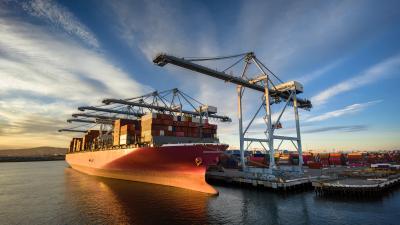
New technologies to improve health and safety performance
Discovering Safety joins forces with Safetytech Accelerator to build a Smarter Regulation Sandbox.
This page is approximately a 5 minute read
This page was published on

Dr Darshana Godaliyadde, Lloyd’s Register
Darshana is Director for the Resilience4Ports initiative, which is led by the International Coalition for Sustainable Infrastructure (ICSI) and supported by Arup, UN Climate Change High-Level Champions, Lloyd's Register and Lloyd’s Register Foundation.
Ports are on the frontlines of climate change. Rising sea levels, intensifying storms, and coastal erosion are damaging infrastructure, disrupting operations, and threatening the reliability of global supply chains. For example, the one-week closure of the Port of Houston during Hurricane Harvey in 2017 resulted in estimated losses of up to $2.5 billion excluding wider systemic supply chain impacts.
Despite their economic importance, many ports face a significant investment gap in adaptation measures. Traditional financing mechanisms often fail to consider the long-term benefits of resilience-building, leaving ports with few incentives to act proactively.
Recognising this challenge, the Resilience4Ports (R4P) initiative was launched in 2022 at COP27 by founding partners Resilience Rising, UN High-Level Climate Champions, Arup, and Lloyd's Register Foundation. The programme was conceived as a strategic response to growing climate risks and the critical need to align port operations with a rapidly evolving global agenda.
R4P also aligns with global frameworks, including the Sharm El-Sheikh Adaptation Agenda (SAA) and the Maritime Resilience Breakthroughs, providing ports with a coherent structure to transform high-level commitments into real-world action.
Since its inception, R4P has developed a suite of practical tools and resources to translate global ambition into localised resilience strategies.
At the core of the programme is the R4P Framework for Action. This framework spans three essential dimensions:
This integrated approach ensures that resilience is not treated as a technical silo, but as a cross-cutting necessity for long-term sustainability.
One of R4P’s flagship publications, Moving the Needle on Port Resilience launched at COP29 highlights how ports around the world are implementing scalable solutions that cut emissions, enhance operational resilience, and improve both community and ecosystem outcomes.
Additionally, R4P has created a knowledge library, offering open-access guidance, case studies, and tool mapped against both the R4P Framework for Action and the Maritime Resilience Breakthrough targets. This was released at COP28.
To catalyse momentum across the industry, R4P launched the 30 x COP30 Call to Action. This initiative aims to bring together at least 30 ports by COP30 around a shared commitment to the resilience goals outlined in the Sharm El-Sheikh Adaptation Agenda.
Signatories commit to four strategic actions:
This collective effort is building a community of practice that drives systemic change while fostering collaboration across geographies, sectors, and disciplines.
The 2025-2027 Strategic Plan, launched at United Nations Ocean Conference (UNOC), lays out a roadmap to embed resilience at the heart of global port systems. It aims to support the direct implementation of adaptation measures, particularly in the Global South where many of the world’s most vulnerable and under-resourced ports operate.
By helping ports access financing, technical expertise, and policy support, the strategy enables stakeholders to move beyond planning and toward tangible action that protects lives, assets, and livelihoods.
This vision is about mainstreaming resilience as a core business function, not an add-on, empowering ports to lead in creating a more equitable, climate-ready maritime future.
Looking ahead, the need of future-proofing port systems is becoming increasingly urgent. The rise in climate-induced physical risks from intensifying acute storms to chronic sea-level rise makes ports some of the most vulnerable nodes in the global logistics network.
To support strategic decision-making, R4P has developed Climate Risk Assessment (CRA) guidance tailored to port decision-makers which will be formally launched at COP30. This guidance addresses CRA capacity gaps of port decision makers and outlines the importance, process involved, and different finance mechanisms including:
By incorporating both Engineering and Nature-based Solutions (NbS), the guidance provides a holistic and financeable approach to climate adaptation.
As the programme moves into its next phase, R4P will be working to develop resilience and sustainability indicators for ports worldwide. These indicators will be critical in:
With robust data, decision-makers can track improvements, share lessons, and mobilise further investment in resilient infrastructure that benefits economies and communities alike.
Ports are not just gateways for goods, they are enablers of economic growth, food security, employment, and community resilience. As climate change and digital transformation reshape the maritime landscape, ports must be equipped not just to survive, but to lead.
The Resilience4Ports programme offers a global platform for collaboration, knowledge-sharing, and innovation. It empowers ports to take meaningful action today ensuring they remain resilient, relevant, and ready for the challenges of tomorrow.
Together, we can future-proof port systems and, in doing so, build a more resilient, inclusive, and sustainable global economy.
